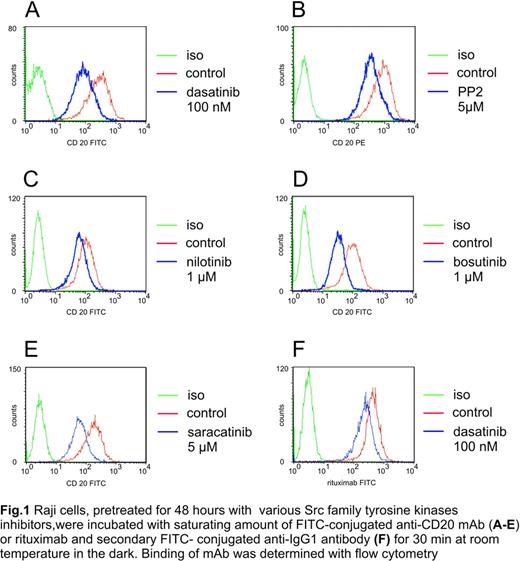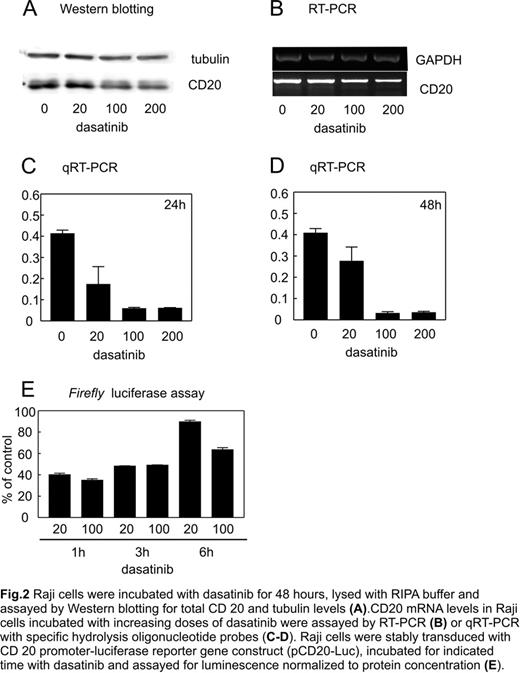Abstract
Abstract 1661
Anti-CD20 monoclonal antibodies (mAbs) have considerably improved the outcomes of patients with B-cell malignancies and reveal promising therapeutic activity in some autoimmune diseases. They eliminate B cells by triggering indirect effector mechanisms of the immune system, namely complement-dependent cytotoxicity (CDC), antibody-dependent cellular cytotoxicity (ADCC), or immunophagocytosis. Unfortunately, the resistance to anti-CD20 mAb-based first line therapies has been a considerable clinical problem. The mechanisms of this resistance are still poorly understood.
In an elegant in vitro study by van Meerten et al. a direct positive correlation between rituximab antitumor activity and CD20 levels has been demonstrated. Although for many years CD20 has been described as a stable antigen, accumulating evidence indicates that CD20 can be modulated at several levels, both transcriptional and posttranscriptional. The processes that lead to CD20 downregulation could potentially impair antitumor activity of rituximab-based therapies and lead to rituximab resistance.
Src family tyrosine kinases (SFTKs) including Lyn, Fyn and Lck have been already reported by Deans et al. to associate with CD20 localized to lipid rafts. They were shown to be activated during anti-CD20 mAb-mediated apoptosis upon clustering of rafts. However, to the best of our knowledge, the role of SFTKs in the regulation of CD20 expression has not been studied so far.
The aim of this study was to explore the molecular basis for Src family tyrosine kinases- dependent regulation of CD20 levels in lymphoma cells.
In the initial experiments performed using flow cytometry we observed a significantly reduced binding of anti-CD20 mAb to Raji cells incubated for 48h with various inhibitors of Src kinases (dasatinib, PP2, nilotynib, bosutinib, saracatinib) (Fig.1A-E). Dasatinib also impaired the binding of rituximab to Raji cells (Fig.1F). Decreased binding of anti-CD20 mAb upon dasatinib treatment was observed in three additional lymphoma cell lines and primary cells isolated from patients with chronic lymphocytic leukemia. All tested SFTKs inhibitors impaired rituximab-mediated CDC (R-CDC) over a dose range of rituximab concentrations (1–100 ug/ml) in all lymphoma cell lines. Interestingly, in Raji cells incubated for 48h with dasatinib we also observed a dose-dependent reduction of total CD20 protein levels, when assayed by Western blotting (Fig.2A). Moreover, a 48-h incubation with dasatinib significantly reduced the transcription of cd20 gene, as assessed with RT-PCR (Fig.2B). To further elucidate the mechanism of transcriptional regulation of CD20 we performed qRT-PCR studies. A strongly reduced transcription of cd20 gene was observed in Raji cells over a dose range of dasatinib (20–200 nM) after 24- (Fig.2C) and 48h- incubation (Fig.2D). Additionally, the CD20 promoter activity measured with reporter Firefly luciferase assay has been reduced as early as 1 hour after dasatinib treatment (Fig.2E). To elucidate in more detail binding of transcription factors to the promoter of cd20 gene, a chromatin immunoprecipitation assay was performed. Our early results indicate that dasatinib impairs binding of PU.1 transcription factor to its consensus site within cd20 promoter in Raji cells.
Our studies indicate for the first time that SFTKs are involved in the transcriptional regulation of CD20 levels in lymphoma cells. Elucidation of the exact mechanism of this phenomena needs further studies. Results of these experiments will help to understand the biology and regulation of CD20 levels in lymphoma cells.
The research was supported by Polish Ministry of Science and Higher Education [N N402 352938 (MW), IP2010/046570 (MW), IP2010/028670 (DN)].
No relevant conflicts of interest to declare.
Author notes
Asterisk with author names denotes non-ASH members.



This feature is available to Subscribers Only
Sign In or Create an Account Close Modal